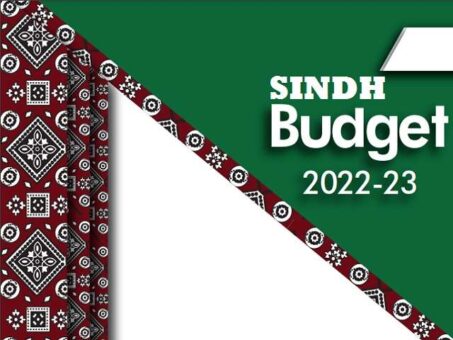KARACHI: Syed Murad Ali Shah, Chief Minister of Sindh on Tuesday presented provincial budget 2022-2023 with total outlay of Rs1.714 trillion.
The province estimated the deficit budget amounting Rs33.85 billion for the next fiscal year.
READ MORE: Khyber Pakhtunkhwa raises salary, pension by 15%
The chief minister said that the total budget outlay for Financial Year 2022-2023 is estimated at Rs.1.714 trillion, as against budget estimate of Rs.1.478 trillion for 2021-2022, showing overall increase of 15.9 per cent.
The current expenditure of the province is projected at Rs.1.254 trillion, which includes current revenue expenditure of Rs. 1.199 trillion and current capital expenditure of Rs.54.5 billion.
This is 73.2 per cent of total expenditure of the province and shows an increase of 9.1 per cent in comparison to the current expenditure for last year that was Rs.1.148 trillion.
READ MORE: Khyber Pakhtunkhwa presents Rs1.33 trillion budget 2022-2023
The chief minister said that for the next financial year, size of development budget will be Rs459.658 billion as compared to Rs. 329.033 billion in year 2021-2022, that will include Rs. 332.165 billion for Provincial Annual Development Plan (ADP) and Rs.30.00 billion for Districts ADP.
Foreign project assistance of Rs.91.468 billion from the development partners and Rs.6.025 billion are expected from Federal PSDP grant for schemes being executed by Government of Sindh.
Murad Ali Shah said shift in federal priorities during last four years caused the people of the second largest province face deprivation due to lack of infrastructure development and non-provision basic health facilities in rural areas.
READ MORE: Advance tax on immovable property purchase enhanced to 250% for non-filers
“Despite these difficulties we maintained our resolve towards our development objectives,” he added.
Hence, next year’s ADP will include schemes to provide basic facilities to the marginalized segments of society. More resources are being allocated for water and sanitation, road network, transport, health and education sectors to provide maximum relief to the common people in the next year’s ADP.
There are 2,506 ongoing schemes with allocation of Rs. 253.146 billion being 75 per cent of total ADP.
There are 1,652 new schemes with allocation of Rs.79.02 billion being 25 per cent age of total ADP
On-Going schemes where more than 70 per cent expenditure is made, have been fully funded for completion by June, 2023.
More than 1,510 schemes have been fully funded and are expected to be completed in next financial year 2022-23.
READ MORE: Pakistan massively increases taxation on motor vehicles
Allocation for Education Sector schemes is Rs. 34.22 billion (10.2 per cent of the total size).
Allocation for Health Sector schemes is Rs. 23.33 billion (6.5 per cent of the total size).
Allocation for Water and Sanitation Sector (PHE & LG) is Rs. 59.36 billion (18 per cent of the total size).
Allocation for Agriculture & Livestock sector is Rs 10.2 billion (3 per cent of total size)
Allocation for Irrigation including lining is Rs. 32.5 billion (12 per cent of the total size).
Allocation for Transport & Communication (Road under W&S and LG) sector is Rs. 100.64 billion (30 per cent of the total size).
Allocation for Karachi based schemes is Rs. 118 billion, Rs.72 billion under ADP, Rs. 5 billion under District ADP and Rs. 41 billion through Foreign Project Assistance.
Keeping in view the above non-development and development expenditure priorities, the major milestones of our objectives are:
READ MORE: New rates of capital gain tax on disposal of securities
Provide infrastructure to educational institutions for increased enrolment.
Improve and Upgrade health facilities and manage available health institutions
Provide nutrition support, community infrastructure funds, income generating grants, micro assets, and low cost housing for reducing poverty of poorest of the poor.
Increase agricultural productivity and value chain, Conservation of water for agriculture, industrial and municipal consumption.
Provide clean drinking water and safe disposal of sewerage.
Improve connectivity between major cities and towns of province.
Increase road connectivity and planned mass transit for Karachi city.
